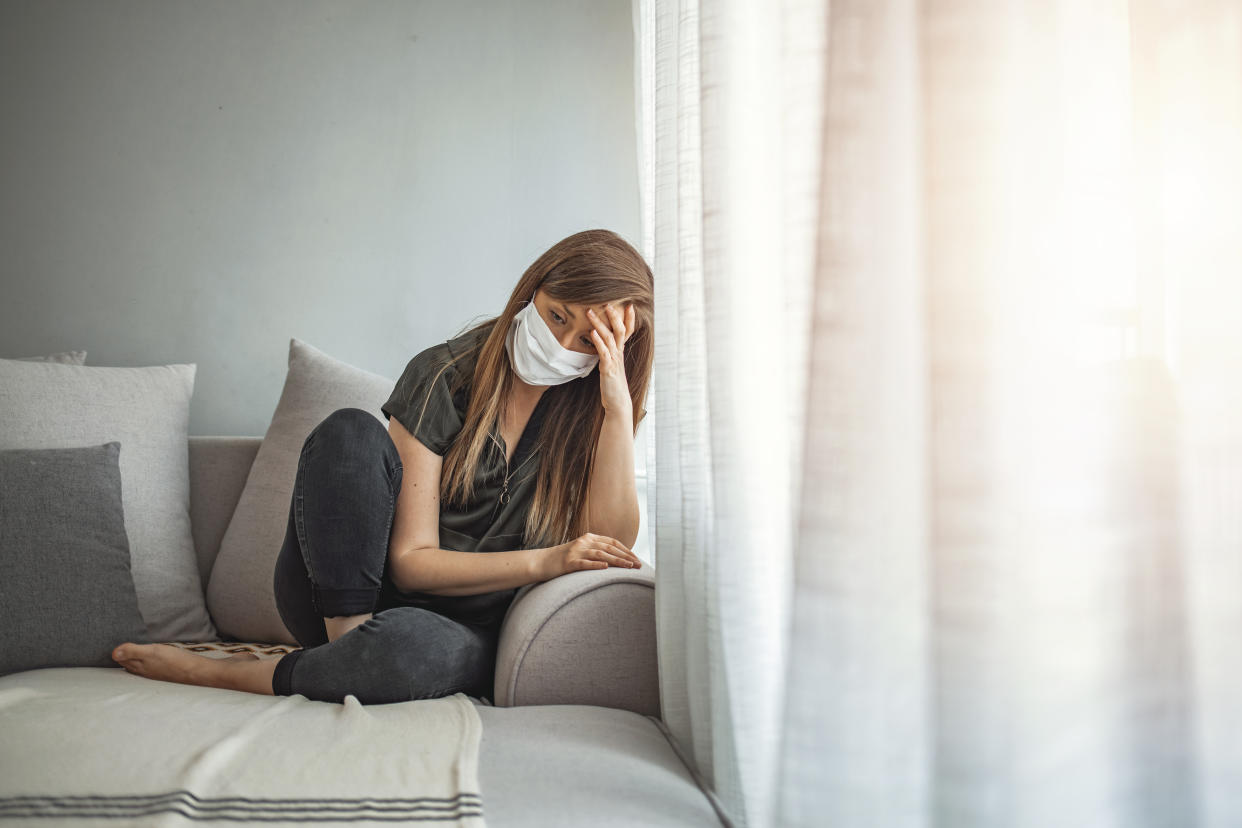‘Am I having a panic attack?’ Anxiety-related Google searches break records amid coronavirus pandemic

Anxiety-related Google searches reached a record high amid the coronavirus pandemic.
The infectious outbreak sent much of the world into lockdown. While many continue to mourn victims of COVID-19, others battle the economic consequences of closed borders, shut hospitality and enforced working from home.
Experts warned early on that the pandemic may have a “profound” and “pervasive” impact on people’s mental health for some time.
Read more: Breast-milk ice cubes could deliver coronavirus antibodies
Scientists from the University of California, San Diego, have since found Google searches for “panic attacks” and “anxiety attacks” in the US were the highest they have been since the data started being collected 16 years ago.
More than three million anxiety-related searches were carried out in the US alone during the first 58 days of its outbreak.
This seems to contradict a recent study by the University of Bristol that found anxiety dropped among young teenagers during the pandemic.

‘Not to be taken lightly’
“A panic attack is not to be taken lightly as it can land someone in the emergency room with shortness of breath, a pounding heart, chest pain, and an intense feeling of fear,” said co-lead author Dr John Ayers.
“As a result, our results unquestionably warrant a need for increased mental health services.”
This is not the first time such concerns have been flagged amid the coronavirus outbreak.
In May, it was reported half a million Britons were taking an online suicide prevention course.
Experts have also warned children may be left with post-traumatic stress disorder as a result of the pandemic.
Read more: Soft singing 'no riskier than talking', coronavirus study finds
The San Diego scientists used real-time data to better understand the coronavirus’s mental health burden.
They analysed US Google queries that mentioned “panic attack” or “anxiety attack” between January 2004 and 9 May 2020.
These included “am I having a panic attack?,” “signs of anxiety attack” and “anxiety attack symptoms”.
The scientists focused on anxiety attacks due to them being a common mental health problem. They can also lead to depression, be triggered by an outside stressor and are socially contagious – particularly amid a pandemic.
Read more: Antibodies protect against second coronavirus infection, study suggests
The largest increase in searches was between 16 March and 14 April 2020, rising by 17%.
This began just days after US president Donald Trump declared a national emergency on 13 March.
Spikes also coincided with the roll-out of national social-distancing guidelines on 16 March and their extension on 29 March.
Google searches also increased when the US surpassed China in reported cases on 26 March, as well as when the Centers for Disease Control and Prevention started recommending masks on 3 April and the US’s death toll exceeded Italy’s on 11 April.
From 13 March to 9 May, the last day of available data, anxiety searches were 11% higher than normal.
Anxiety searches at 16-year high
Searches began to return to normal levels by 15 April, “perhaps because Americans have become more resilient to the societal fallout from COVID-19 [the disease caused by the coronavirus] or because they had already received whatever benefit they could from searching the internet”, according to the scientists.
“In practical terms, over the first 58 days of the COVID-19 pandemic there were an estimated 3.4 million total searches related to severe acute anxiety in the United States,” said study author Dr Benjamin Althouse.
“In fact, searches for anxiety and panic attacks were the highest they’ve ever been in over 16 years of historical search data. ”
The scientists acknowledged helplines like Illinois’s Call4Calm, which supports people with coronavirus-related anxiety.
“Similar hotlines should be rolled out nationally and prominently featured in the search results of those seeking help online,” said study author Dr Derek Johnson.
“Similar applications to suicide have had tremendous benefits on public health and saved lives.”
In the UK, people can contact The Samaritans for confidential emotional support at times of distress by calling 116 123 or emailing jo@samaritans.org.
“It may take years to fully comprehend the societal fallout of COVID-19,” said study author Dr Adam Poliak.
“With time, we may find that many more wraparound services will be needed to respond to other collateral impacts and our rapid data driven approach could be used for targeting and prioritising responses to those impacts.”
The scientists noted that searches for unproven treatments and even gun sales also rose at the start of the pandemic.
They hope officials will use Google searches to help those in need.
Writing in the journal JAMA Internal Medicine, the team said traditional population mental health surveillance – like telephone surveys or analysing medical records – were time-consuming and expensive methods that may miss those who do not seek care.
“In theory, decision makers could track searches for hundreds of mental health problems, identify the subset that have greatest volume and target resources to meet those needs,” said co-lead author Dr Alicia Nobles.
“As political and policy leaders debate where to spend health resources to address the mental health burdens of COVID-19, timely, empirical evidence like we provide can ensure that limited resources are allocated to the most dire needs.”


